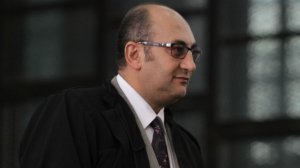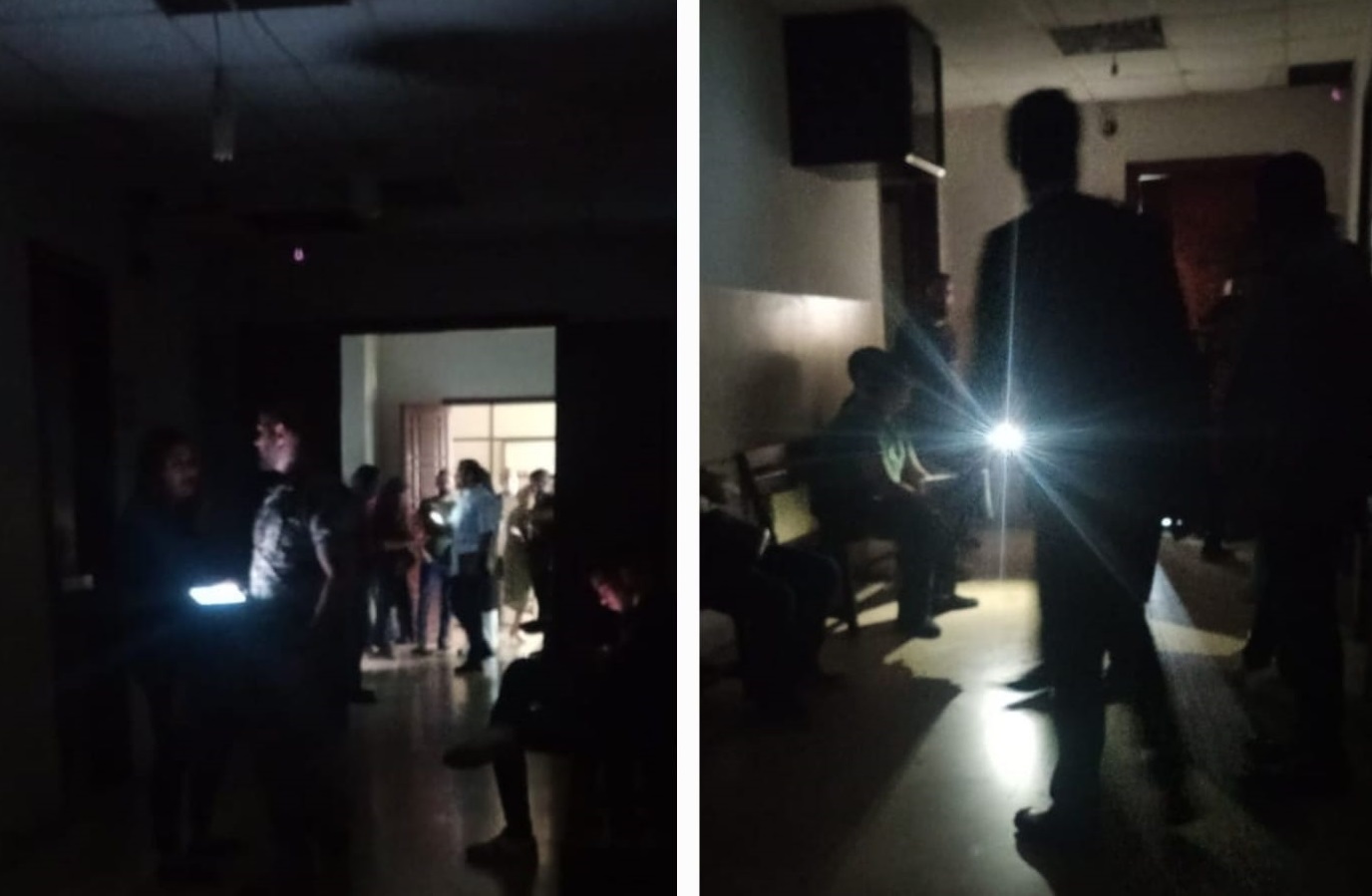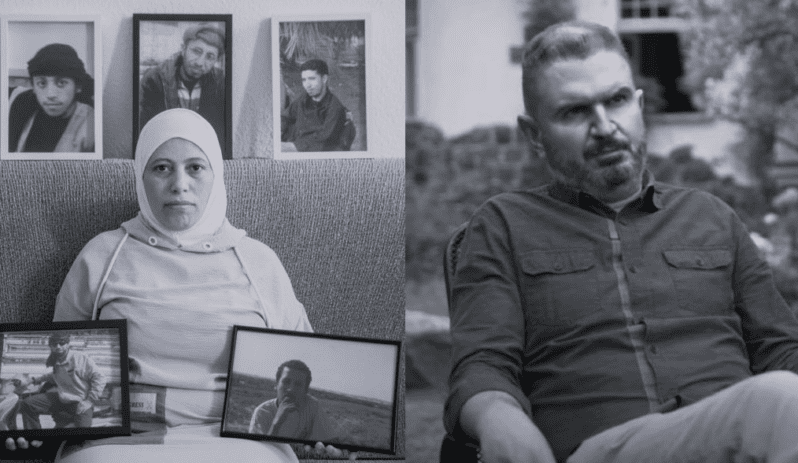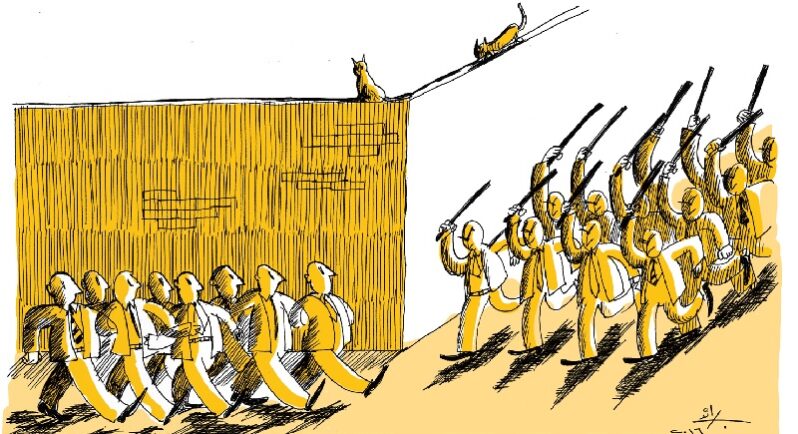Khaled Ali: The Tiran Ruling Transformed the Egyptian Judiciary’s Image

On April 9, 2016, Egyptians awoke to the news that the Egyptian government had signed a maritime border demarcation agreement with the Saudi Kingdom, recognizing the Kingdom’s ownership of the Tiran and Sanafir islands situated in the Red Sea.
Confronted with this agreement, a number of Egyptian lawyers, foremost among them Khaled Ali, Former Director of the Egyptian Center for Economic and Social Rights (ECESR), filed a challenge in the Court of Administrative Justice. The court actually issued a ruling upholding the challenge, but the government then appealed the decision before the Supreme Administrative Court. Notwithstanding the appeal, the case wherein the Egyptian judiciary “rebelled” against the government and declared Tiran and Sanafir Egyptian stirred a ruckus in legal, social, and political circles in Egypt and the Arab region.
Notable events accompanied the case. The most significant was the detention of lawyer Malek Adly of ECESR, who is one of the lawyers who signed the case. A number of protesters condemning the demarcation agreement were also arrested. The ruling upholding the challenge also sparked a commotion among the general Egyptian public. Many human rights lawyers saw a significant shift in the general public’s view of them; following the ruling, this view was no longer negative and unwelcoming of their work.
While Khalid Ali was in Lebanon on The Legal Agenda’s invite, he gave a series of public interviews, including the one below conducted on September 9, 2016.
LA: What were the biggest challenges accompanying the case?
Among the biggest challenges facing this case was that it was directed, in one way or another, against two countries, each with the privilege of possessing and/or concealing documents. This case also faced some reservations from political people who thought that filing a court case in the issue of the islands would extract popular anger from the street, and transfer it to the court. This [i.e., the notion that taking a cause to court wrongly diverts the populace’s anger away from political struggle] is a traditional point of contention among those who distinguish between the settings of political struggle, on the one hand, and legal struggle in court, on the other. We were also worried about not presenting enough evidence, and thus cementing the sale of the islands via a ruling to that effect. Hence, we could only go to court after thinking of an alternative. So we agreed on filing another case that did not include my own name or the names of any of the lawyers who signed the case to annul the agreement, and instead included the names of other lawyers from the center. The second case was based on the following: if the court issued a ruling deeming the land to not be Egyptian, then it is established that Egypt exercises sovereign rights over them [the islands]. Under the Constitution, sovereign rights can only be relinquished via a referendum. Hence, if we lost the first case in the Administrative Court, we would have filed the second case to compel the Egyptian government to hold a referendum. As such, we were insistent that statements about the case be frank with the people; this was just an attempt that was as likely to succeed as it was to fail. That was important for upholding the credibility of lawyers. We have to stay modest because the battle’s outcome is in not just in our hands, but also in the judiciary’s. “Bold” statements are not helpful, and we could not pin all of the people’s hopes on this case.
LA: What kind of pressure was exercised on the lawyers? Tell us more about the Malek Adly case and the role of the Bar Association.
Two kinds of pressure were exercised in the Tiran case. Firstly, there was the pressure of the media campaign that the state launched against us. This case has a political side opposed to the regime, which naturally impacts largely on the lawyers’ image. We were accused of being unprofessional and nonobjective, and web brigades spread threats on Facebook and Twitter (“You’ll be locked up” and “Your day is near, traitors and collaborators”). Secondly, cases were fabricated against a number of lawyers close to us (such as Sayed Al-Banna, Haytham Mohamadeen, and Malek Adly).[1] They were charged with concocting the “rumors” that Tiran and Sanafir are Egyptian.
The Bar Association did not play as large a role as we had hoped. I understand that the Bar is susceptible to the same instances of polarization that affect society. However, among the Egyptian syndicates, the Bar Association is thought to play the weakest role at present. The doctor’s syndicates, for example, support arrested doctors. The Bar Association did not play a large role in the cases of the arrested lawyers except that of Malek Adly, wherein the Bar’s president personally attended the case’s final hearing. The Bar also filed complaints in order to assist us.
We had hoped that the Bar Association would lead the spectacle, but many lawyers from other political factions –such as the Muslim Brotherhood– have previously been arrested and the Bar played no role in their favor. I think this prevented the Bar from playing a larger role in Malek Adly’s case.
LA: Do you believe that the development in the Bar Association support was a result of the win in the case of the two islands?
There is no doubt that the ruling on the islands made a big difference. But the Bar hadn’t abandoned us completely. It was filing complaints and taking measures, but these measures remained perfunctory from our perspective. We wanted the Bar to bear the case as though it were its own. I think that happened in the final hearing, when the Bar’s president personally attended, as did the president of the branch in the Qalyubia Governorate [Malek Adly’s governorate]. Their presence was important for the case, but I hope that occurs in all the cases.
LA: You obtained the documents that you presented in court by asking ordinary people to supply them. How do you evaluate the cooperation with these non-legal people in preparing the case?
I asked via my personal Facebook account for specific documents by name. On occasion, we asked for any documents available about Tiran and Sanafir. Many people came forward and presented their documents, not knowing whether or not they are important. Of course, we obtained many important documents this way, as well as documents that were not useful.
LA: The success in the Tiran case cuts across the judiciary, activists, the dominant media, and social media. How do you evaluate the experience?
This case is different than any other that I have worked on in my career. Its nationalist dimension is extremely clear. All of the cases that we work on have a nationalist dimension at a minimum, but they usually touch on economic and social rights [too]. As for this case, it is largely connected to the idea of national dignity. Hence, the response, assistance, and support that this case received from the people was huge, and paralleled the size of the case itself. It is indeed an inspiring case, for the Egyptian administration treated the citizens like they did not exist and their opinion did not matter. The people suddenly saw that the islands they had long considered Egyptian as no longer so. This provoked many Egyptians. Besides the fact that the islands of Tiran and Sanafir are Egyptian, the means via which they were ceded provoked the people. Some people may have accepted the cession if the government had scripted it better. The idea of national dignity was very influential in this matter. This is the case wherein we have felt the most sympathy, and the biggest desire to support and advocate on the behalf of the people.
LA: What impact does the ruling have on the relationship between the Sisi-ism and the revolutionary youth?
We [i.e., the revolutionary youth] sometimes cannot understand the perspectives of the general public. And sometimes the [revolutionary] youth are above such an understanding. When the people are told, for example, that we must preserve the pillars of the state so that we do not become another Syria or Libya; we understand it as a phrase for political consumption with no real value. But the general public genuinely accepts it and fears it. We cannot be above understanding the people – that’s a mistake. We must appreciate the Egyptian public’s genuine fear, for it sees the most difficult scenes of Libya, Syria, and Yemen on television, and it fears that it will happen in its own country. It therefore accepts a somewhat undemocratic regime in exchange for a stable state that does not reach the same stage that other states have.
The islands issue was presented to the Egyptian people in the context of a military leader who came to preserve the pillars of the Egyptian state, and whom they believed when he said, “I asked everyone, and the minister of defense, and the minister of foreign affairs; other ministers all said that [the islands] are not Egyptian and I do not want any further talk about the issue”. But when the court ruling arrived, it implicitly said, “you’re dishonest; you deceived the people”.
Certainly, this ruling prompted many people to rethink, and it raised questions about the truth of the accusations against the revolutionary youth; are they really thugs and funded [by foreign powers]? The truth is that those who have thus far defended these islands are the revolutionary youth, and they are the ones defending the pillars of the state and its territory in the face of authorities, and Saudi Arabia in the context of the international and regional plan for the islands.
LA: Is there a link between the release of some of the activists in the Tiran protests and the issuance of the ruling?
Some people were released before the ruling, and rulings acquiting many of them were issued after the ruling. In any case, the ruling went a different way: there is a dispute between government and us, and its voice is louder because it has the media’s support and coverage. However, post-ruling we are now ahead of the government. Our demands were corroborated and the government was proven wrong. We are still facing an appeal of the ruling, but certainly, the ruling issued has put us a step ahead of the government, for now.
LA: Around 150 lawyers signed the case. Is this a strategy of protecting lawyers by filing a collective suit?
When we filed the case, we found that many people wanted to be involved. We felt that this case was not just ours; rather, it belonged to the community and all those wanting to participate in it. We held a meeting for the lawyers, wherein two perspectives were put forward: firstly, all lawyers should join the case; and, secondly, a new case should be filed. The majority preferred the first option, although many of the lawyers did want to file new cases. The basic petition was shared with them so that they could use it or write something similar, or copy parts of it. So a series of cases were filed, and the court took the case that I filed and another case, and examined them individually. When we won the case, the people that filed the second case offered to help us and we became one team.
I should mention that not all of those lawyers fall within the category of “civil society lawyers”. Among us were “traditional” lawyers, and we were insistent on integration. Sometimes, traditional lawyers have reservations about the civil society lawyers, and claim that the latter are funded [by foreign powers]. But we remained eager to involve the “traditional” lawyers when they wanted to cooperate with us. Similarly, as lawyers we are of recognized competence and have a good professional reputation, so they also wanted to be part of this success, and we always welcome cooperation.
LA: In your opinion, can [organizations representing] the specialist sectors, such as the Bar Association or the doctors’ or press syndicates, be more effective than political parties in the present situation? Can they act as a bridge between the general mood of the public and the initiatives demanding change?
Sometimes the syndicates try to perform this role. For example, the Doctors’ Syndicate succeeded in doing so in relation to its economic case, and to the attacks on doctors in hospitals. The Bar Association and the Journalists’ Syndicate try to do so, but the outcome does not live up to our hopes. We hope that these syndicates take bigger and more important steps than these.
LA: How do you explain the existence in Egypt of a judicial and legal trend capable of standing up to a prevailing popular and political situation? Does the judiciary have historical precedents that put the Tiran ruling into context?
The Tiran and Sanafir case cannot be put into any context. It is the first time in the history of the Egyptian judiciary that a court has examined a dispute wherein the government says that land does not belong to it, while the citizens say otherwise. This dispute is new to the judiciary.
LA: How did the media follow the legal proceedings? Tell us more about the relationship that you, as lawyers, have with the media?
The journalists attended the court hearings with us. I would photocopy the document for them, and then send out the copies after presenting it in court. Journalists are naturally concerned with getting the scoop, and I wanted to surprise the court. I did not want the court to feel that the document was presented only to attract the press; rather, I wanted it to also feel like I was presenting something significant and new.
LA: How does the ECESR see its role in promoting the independence of the judiciary?
Our belief in the importance of legal struggle and striving to obtain good rulings is support for the judiciary’s independence. I do not necessarily have to organize a conference or publish a book on the matter. My presence in court and my acquisition of good rulings gives a sense of people’s trust in one another. The Tiran ruling transformed the image of the Egyptian judiciary. The people had been speaking negatively about the Egyptian judiciary, but the Tiran ruling prompted them to wonder, how could the judiciary have issued this ruling? Indeed, it has become evident that there are judges making an effort and acquitting the protestors. Of course, this is not enough, but it reflects a positive image. I suppose that this is indirect support for the judiciary’s independence; but, it is essential to the idea of the judiciary’s independence and the image of the judge.
This interview is an edited translation from Arabic.
__________
[1] Haytham Mohamadeen remains detained, whereas Malek Adly and Sayed Al-Banna have been released.



